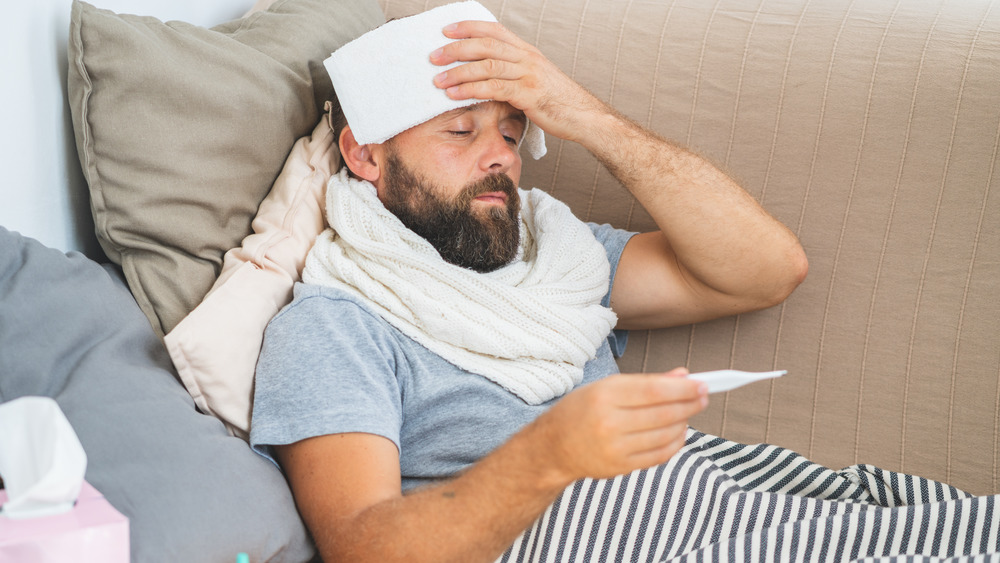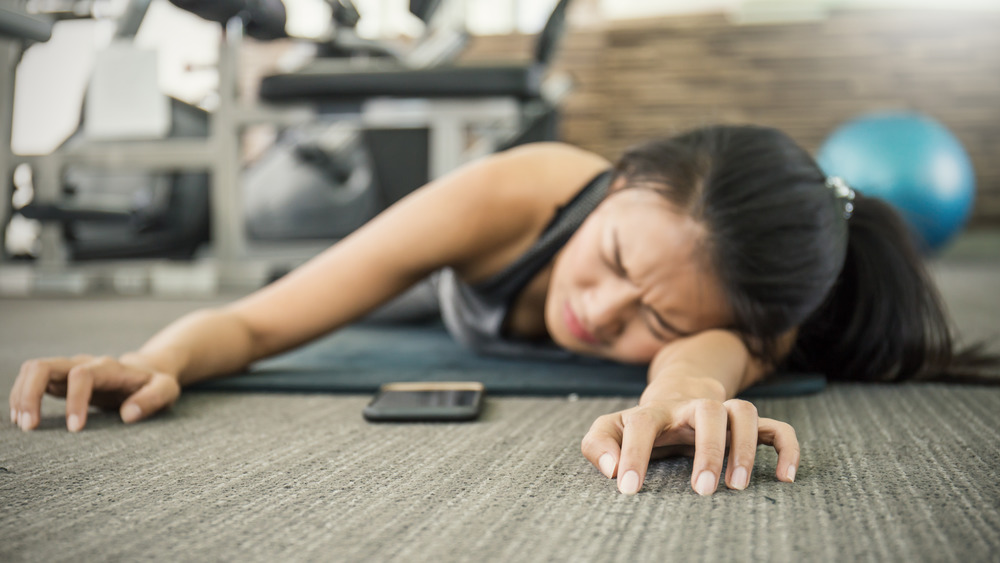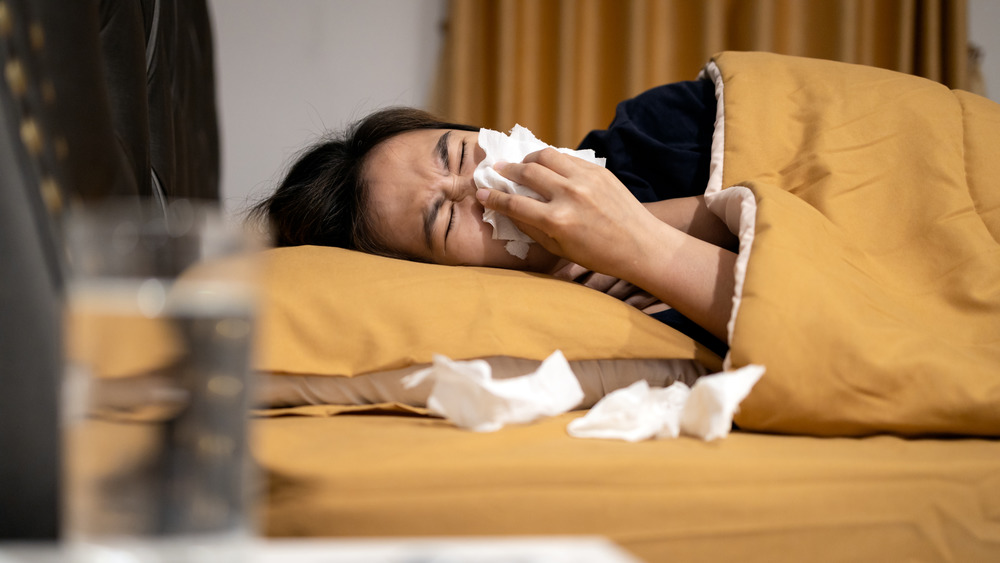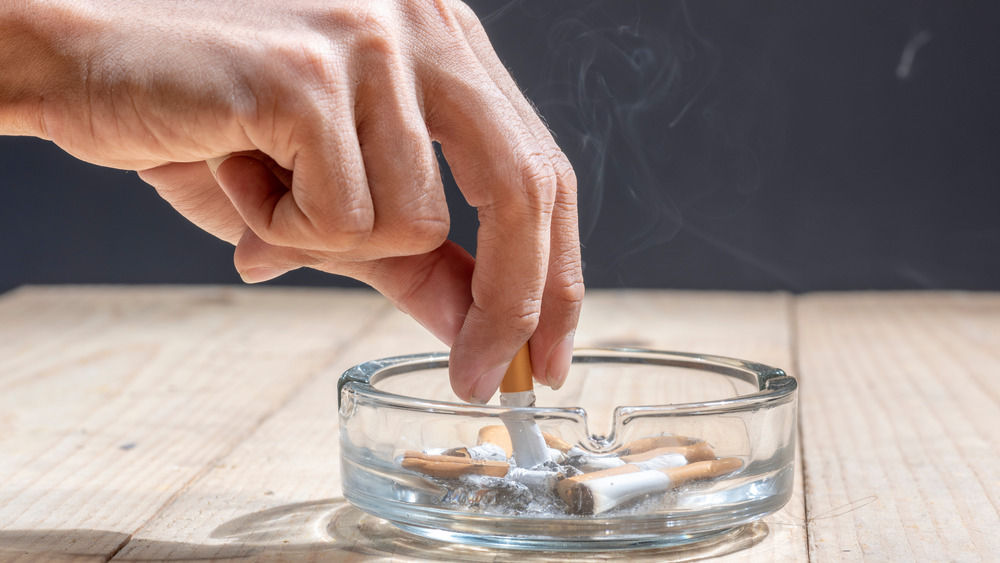Mistakes You Never Realized Were Making You Even More Sick
Being sick sucks. Whether you have a cold or the flu, you're surely desperate to feel better. We all know the symptoms of these various ailments: sneezing, coughing, stuffy nose, sore throat, headaches. If you've come down with the flu, you may also be dealing with a fever or body aches. You'll probably be in for an uncomfortable seven to ten days with the common cold and three to seven with the flu, according to the Centers for Disease Control and Prevention (CDC). With the flu, you might also have to deal with a lingering cough or feeling rundown for as long as two weeks, the CDC explained.
Even if you manage to dodge the flu by getting the flu shot, the average adult gets a cold two or three times a year, according to the CDC. While we may each have our own tips or tricks to make our symptoms a little more bearable, you might unknowingly be making yourself feel worse. Avoid these common mistakes that could prolong or worsen your seasonal misery.
Mistake: Ignoring your symptoms or trying to work through them
Give your body a break when you're sick so it can focus its energy on fighting off the infection, according to WebMD. If you're running around town, subjecting yourself to the everyday stress of your day job, or otherwise overexerting yourself, it's going to take you longer to get better. Besides, you could spread your germs to others. Listen to your body, and stay home from work or school until you're feeling closer to normal.
Don't ignore symptoms more common with the flu, like a high fever, body aches, and unusual tiredness, especially if they come on suddenly, advised WebMD. While a trip to the hospital is probably unwarranted, do call your doctor. If they suspect the flu, they may prescribe an antiviral like oseltamivir (Tamiflu), which if taken within the first two days of your symptoms, may decrease your sick days and make your symptoms less aggressive. Elderberry supplements can have a similar effect, a review in Advances in Integrative Medicine found.
Note: Shortness of breath when you don't have asthma and a loss of taste or smell are symptoms of COVID-19 (via Samaritan Health Services). If you're experiencing these, call your doctor right away.
Mistake: Working out while sick
If you think you can sweat out a fever through exercising, think again. A 2014 review study in the medical journal Sports Health found that working out while "febrile" (having a fever) will only aggravate your illness, not help you get over it faster. Besides, hitting that yoga or spin class when you know you're sick puts others at risk of catching whatever you've got. Don't be that person.
If you're fever-free, the Mayo Clinic says mild or moderate exercise is okay. But walk, don't run — literally — and shorten the length of your activity. Mild exertion could even help relieve some congestion, as long as your symptoms are "above the neck," like nose troubles or sore throat.
If you're feeling funky "below the neck" (i.e., experiencing chest congestion, feel sick to your stomach, or have a gnarly cough), then wait until those symptoms have passed before you resume your regular workout regimen, according to the Mayo Clinic. You should also skip taxing physical activity if you're experiencing muscle aches or fatigue. When in doubt, just don't push yourself.
Mistake: Not drinking enough water
Staying hydrated is always important, but when you're sick you should be filling up with as many clear liquids as you can, including decaffeinated teas and broth. If it hurts to swallow, try sucking on ice. The last thing you want is your body to be running on fumes while it's trying to fight off an infection.
We're all constantly losing water just by breathing, sweating, and going to the bathroom, so keep topping up on fluids. Being dehydrated even when you're not sick can leave you feeling tired and weak, according to Harvard's Healthbeat, so dehydration when sick could leave you feeling that much more run down.
Proper hydration can also help clear congestion, according to Healthline, helping you to feel better sooner. Plus, your body needs water to produce lymph, the clear fluid that your immune system uses to transport white blood cells (aka infection-fighting cells) all around the body (via Cleveland Clinic). So help your body help you, and drink up.
Mistake: Drinking citrus juices
If you've got an upset stomach or a sore throat, you should steer clear of orange juice. All the acid in citrus juices can irritate the lining of your stomach, especially if you aren't consuming much else while you're sick (via The Healthy). A sore throat is another reason to avoid OJ: The acid can aggravate your already-inflamed gullet, according to Medical News Today. Opt instead for hot teas and soups, which can soothe your throat and hydrate you at the same time — and without all the sugar.
Besides, vitamin C for cold and flu relief may be overhyped. A 2013 review of multiple studies showed that while regular (daily) vitamin C supplementation could lessen the duration and severity of a cold by about 8 percent, taking vitamin C just while you're sick had no similar effect.
If you're determined, though, opt for fresh fruit. Wendy White, a professor of food science and nutrition at Iowa State University, told NPR that eating whole fruit is better because it won't spike your blood sugar like store-bought juice. Still want juice? At the very least, choose juice with pulp, which has more fiber — a nutrient most Americans don't get enough of.
Mistake: Using scratchy tissues
Repeatedly blowing a leaky beak can irritate the sensitive skin around your nostrils and upper lip, and who wants to deal with inflamed, peeling skin on top of a cold! Treat yo'self to moisturizing tissues when you're dealing with rhinorrhea, a fancy word for runny nose. Harsh, scratchy facial tissues, toilet paper, and paper towels can feel like sandpaper on painful nostrils and rob the skin of moisture, according to ZocDoc.
Blow gently to protect your schnoz skin from getting chapped and potentially even getting infected (via WebMD). Staph bacteria can live symbiotically on our skin or in our sniffers, but small breaks in the skin barrier can lead to staph infections like impetigo. Luckily, simply applying Vaseline can help prevent chapping. Zocdoc experts recommend petroleum jelly because it doesn't contain fragrances or other chemicals that could further irritate or dry out your skin. Plus, it forms a protective barrier to lock in moisture. Be sure to reapply if it gets wiped away along with your mucus.
Using a humidifier can also help prevent dry skin, and as a bonus it can soothe your angry sinuses (via Mayo Clinic). Just keep it clean, or it could make you sick all over again.
Mistake: Turning to comfort foods
We know you're really going through it, but don't treat your infection like a hangover. Registered dietitian Maryann Tomovich Jacobsen explained in an article for WebMD that foods high in sugar, refined carbohydrates, and saturated and trans fats interfere with proper immune system functions, which will slow down your recovery.
Fried foods contain massive amounts of fat, which can trigger inflammation in the body, clinical immunologist Leonard Calabrese told the Cleveland Clinic. When you're sick, your body is already having an immune response to fight off your infection. That's healthy inflammation. But excessive or prolonged inflammation can cause the body to start destroying healthy cells, making you feel worse, not better, and in the long run can lead to chronic diseases like diabetes or cancer, according to Scripps.
Sugar can actually suppress your immune response, which also means you'll be sicker longer. Niket Sonpal, a board-certified internist and gastroenterologist in Brooklyn, New York, told HuffPost that this suppression can start a half-hour after consuming the equivalent of two cans of soda, and can last up to five hours. Do you really want to add time onto your sickness sentence? We didn't think so.
Mistake: Using sugar-free cough drops or artificial sweeteners
While it's a good idea to skip the sugar when you're sick, that doesn't mean you should turn to the fake stuff. Our guts can have a hard time digesting artificial sweeteners like xylitol and sorbitol, which are often used in sugar-free cough drops. If your body doesn't tolerate these sugar substitutes, you could wind up with an upset stomach or diarrhea, physician Irvin Sulapas told The Healthy. Diarrhea equals dehydration, which robs your body of the water it needs to keep fighting your infection (via Harvard's Healthbeat). And it's not fun, either, on top of whatever other symptoms you're dealing with.
For some people, artificial sweeteners can also trigger headaches, according to WebMD. Best to avoid that possibility altogether, right? If you're struggling with a cough or sore throat, choose cough drops sweetened with honey instead, or even just plain old honey. The CDC says honey can relieve cough in adults and children over one (never give honey to infants). Dr. Sorana Segal-Maurer, chief of the Division of Infectious Disease at New York Hospital Queens, told WebMD that gargling with warm salt water can also help relieve a sore throat, and it helps flush out viruses. Bonus!
Mistake: Drinking caffeine or alcohol
Should you caffeinate when under the weather? It depends. Registered dietitian Jenny Beth Kroplin told Well+Good that the downside to caffeine is that it's dehydrating, and dehydration is the opposite of ideal conditions for quick recovery. "While you're sick, it's very important to stay on top of hydration to help the body thin mucus [and] replace fluids lost," Kroplin said. Plus, caffeine could interfere with a good night's sleep, and you need adequate sleep if you want your body to produce enough infection-busting proteins and antibodies (via Mayo Clinic).
But if you're feeling on the upswing, coffee may provide you the boost you need to break through your general crumminess, Kroplin said. Coffee also has loads of antioxidants. "Research suggests the antioxidant activity from coffee, specifically from ferulic and caffeic acids, has anti-inflammatory, antibacterial, and antiviral effects," according to Kroplin. "This can all be helpful to the body in healing from an illness."
However, alcohol is a straight up no-no. Physician Michael Albert told Popsugar there is ample evidence that alcohol suppresses our immune systems, even in smaller amounts, which could prolong illness. It can also negatively interact with some over-the-counter medicines. So say no to that hot toddy.
Mistake: Smoking cigarettes or vaping
Lighting up could be the reason your cold or flu is so bad in the first place, but maybe not for the reason you think. Researchers at Yale discovered that in mice who were exposed to the equivalent of as few as two cigarettes a day, the flu triggered a hyperactive immune response, which led to excessive inflammation and tissue damage. The study's lead author, Dr. Jack A. Elias, said the findings suggested that "smokers do not get in trouble because they can't clear or fight off the virus; they get in trouble because they overreact to it. It's like smokers are using the equivalent of a sledgehammer, rather than a fly swatter, to get rid of a fly."
And before you reach for your Juul, think again. Research published in PLOS One in 2015 suggests that inhaled vapor from e-cigarettes can interfere with the lungs' ability to fight viral and bacterial infections. Although many of the vaping studies done so far have been conducted on mice, pulmonologist Farrah Kheradmand told Healthline that we can be pretty certain humans experience similar effects, since "most of the immune responses to viruses and bacterial pathogens are very similar among mammals."
Mistake: Lying down
Being completely horizontal, clutching your pillow for comfort, might sound like the only thing you want when the common cold or flu strikes. And getting plenty of sleep is paramount. But you'll feel better if you use those pillows to prop yourself up — especially when you've got the flu, Dr. Patricia Whitley-Williams, division chief of allergy, immunology, and infectious disease in pediatrics at Rutgers Robert Wood Johnson Medical School, told WRCBtv. "It feels better to have your head up and it makes it easier to breathe," said Whitley-Williams.
If you're lying down, it becomes harder to cough, which could trap bad bacteria in your respiratory tract, and potentially even lead to pneumonia whether you've got the flu or even just a cold (via The New York Times). Staying vertical can also decrease the amount of mucus that drips down the back of your throat, which in turn can lessen coughing and sore throat symptoms, WRCBtv reported. Besides, it's easier to drink water and sip soup sitting up, which you should be doing frequently if you want to get better.
Mistake: Taking a cold shower
If you're head is hot to the touch, a cold shower might sound like a quick fix. But you should resist the urge for a polar bear plunge. ”Do not use an ice bath or cold [shower]. It will make the fever go up," Dr. Patricia Whitley-Williams, division chief of allergy, immunology, and infectious disease in pediatrics at Rutgers Robert Wood Johnson Medical School, told WRCBtv. Cold water will cool the surface of your skin, but that could lead to shivers, which will just prompt your body to raise its internal temperature, not lower it. Instead, "Sponge down in lukewarm water," Whitley-Williams said.
You don't have to suffer, though. Try a cold compress (think: bagged ice, a bag of frozen peas, or a cold washcloth) to make yourself more comfortable, Healthline suggested. Peppermint essential oil can also be applied to the skin to soothe a fever, and as a bonus, peppermint oil is renowned for its ability to ease nausea, as a study in Journal of Holistic Nursing revealed. Just make sure to avoid getting it too close to your eyes.
Mistake: Using or asking for the wrong medicine
Medicine just makes us feel better — even if it doesn't do anything (hello, placebo effect!). But when you're dealing with a cold or the flu, some medicines can hurt more than help. Let's get this out of the way first: You don't need antibiotics to treat the cold or flu, so don't pressure your doctor into prescribing them (it's a real thing, a study found).
All variants of the common cold and the flu are viral infections, which won't respond to medicine designed to treat bacterial infections (via U.S. Food & Drug Administration). Besides, taking antibiotics when you don't need them can lead to unpleasant side effects, like yeast infections for people with vaginas, or antibiotic resistance, which can prevent the medicine from working in the future when your body is trying to fight off a bacterial infection.
The Centers for Disease Control and Prevention says using pain relievers like acetaminophen or ibuprofen are okay — just use caution when giving them to children. But if you're seriously stuffed up, be wary of overusing decongestants. Linda Anagewa, a physician with PlushCare in Alea, Hawaii, told Real Simple that using over-the-counter nasal sprays to treat stuffy nose for more than a day or two can wind up leading to rebound congestion. No thank you!
Mistake: Not getting enough sleep
Netflix and ill, amirite? Binging tv may be our modern comfort pastime, but don't let the sixth season of that sappy soap interfere with your sleep. Getting a full night's rest helps charge up your immune system by upping the effectiveness of specialized virus-fighting T cells, according to a 2019 study in the Journal of Experimental Medicine. If you don't give your body the ZZZs it needs, your immune system will be slower in helping you recover.
But we know it's not always easy to get all 40 winks or a full eight hours. In fact, one-third of American adults don't get adequate sleep on a regular basis, according to a 2016 study by the CDC. If that describes you, make it a priority to get at least seven hours while you're sick. And consider making it a regular habit.
People who don't get enough sleep are more likely to get sick when they're exposed to a virus, according to the Mayo Clinic. It also raises the risk of many other chronic diseases, including obesity, diabetes, heart disease, stroke, and even frequent mental distress, according to the CDC. Ain't nobody got time for that.
Mistake: Not seeking medical care when you need it
Most people will get over a cold or the flu on their own in a week or two, according to the CDC. But if you experience symptoms like difficulty breathing or a fever that lasts longer than four days, it would be a mistake to avoid seeking medical care. As Advent Health explained, "If you feel sick, calling your doctor or scheduling a telemedicine visit can help your doctor determine the care you will need to monitor your condition and prevent it from developing into something more serious."
According to the CDC, you should certainly call your doctor if you're not urinating, experiencing chest pressure or pain, or having dizzy spells or confusion. If you continue to get worse or temporarily get better and then worse, or experience severe muscle pains or weakness, you will want receive medical attention. Of course, this list of symptoms is not all inclusive. You know your body better than anyone else. If something is wrong, don't hesitate to seek medical care. But if you're simply dealing with a run-of-the-mill cold or uncomplicated flu, avoid the common no-nos to get well soon! Your body will thank you.















